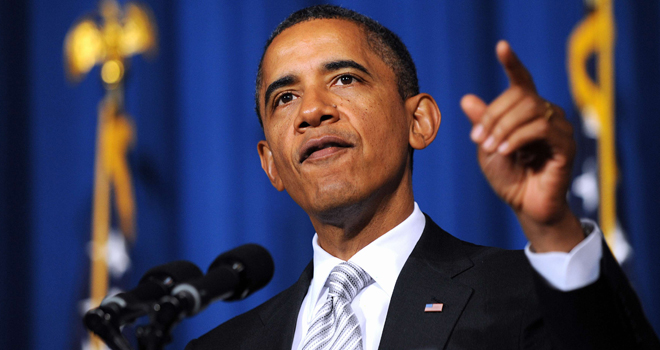In his third State of the Union address Tuesday night, President Obama gives policy shape to the so-called “Buffett Rule” — the principle that wealthy Americans should bear at least as high a tax burden as middle class workers — by telling the American people that no one making over $1 million a year should pay less than 30% in federal income taxes.
But don’t mistake this for a generic call for Congressional action, or the sort of pie in the sky national goal that often marks major Presidential addresses. The push also serves as an effort to set a simple but resounding tone for the 2012 election and simultaneously draw a convenient contrast with his likely general election opponent Mitt Romney (R) who today revealed he only paid 13.9 percent in taxes on his more-than $20 million income last year.
The President’s pivot comes after a year in which the White House worked assiduously to refocus the national debate from budget retrenchment to economic growth, tax equity, and the preservation of federal programs for older and poorer Americans. And they come just as political developments and public perception have shifted in his party’s favor. The theme of restoring equality of opportunity for the middle class capitalizes on the Democrats’ victory last month over House Republicans, who opposed extending a payroll tax cut aimed at those hit hard by the economic crisis, and 30 years of stagnating wages. In that battle, Democrats succeeded in painting the GOP’s hesitance to continue the tax holiday as evidence that they oppose government action to help working Americans, particularly as they continue their years-long fight to protect the upper classes from any tax increases of any kind.
The President’s “Buffett Rule” proposal will not appear in his official budget, set to be unveiled Feb. 13. Nor is it packaged as legislation and scored by the Congressional Budget Office. Instead, one senior administration official said, it’s a principle the President will advocate forcefully in the months ahead — both as an action Congress should take and a rallying cry for an electorate increasingly concerned with economic equality. Politically, it serves as a cudgel to wield against the GOP, capitalizing on the argument that they support a tax code that’s rigged in favor of the rich.
Obama wants to satisfy the federal 30 percent tax rule with comprehensive tax reform that includes eliminating breaks for millionaires and billionaires, including on mortgage interest, health care, retirement, and child care, a senior administration official said, explaining that the President sees no need to sustain those tax benefits for the wealthy.
The senior White House official denied that the speech was implicitly aimed at Romney, but the subtext nevertheless points to one of the former Massachusetts governor’s major political weaknesses in a general election.
The underlying themes of Obama’s speech Tuesday involve bolstering a middle class that has been left behind economically, and re-tilting policies that benefit upper earners in the other direction — with individual and corporate tax reform, as well as major investments in rebuilding American infrastructure paid for with savings drawn from winding down the wars in Iraq and Afghanistan. He also proposes stricter oversight of Wall Street, including the establishment of a Financial Crimes Unit with elevated penalties for financial fraud.
As part of this broader effort, Obama will also seek to impose a minimum tax rate on U.S. companies that do business internationally while creating new incentives to create jobs and home, such as cutting taxes on domestic manufacturers.
It is a bouquet of themes President Obama and Democratic leaders hope will shape the 2012 elections. And the new push suggests a growing confidence on their part that the public has tired significantly of the anti-government themes of 2010 and 2011 like slashing federal programs and shrinking the size of the federal government. They represent a populist turn for a Democratic incumbent, suggesting a recognition that these views have gone mainstream, and that the political zeitgeist does not require a reactionary, election-year shift to the center. The prescriptions lay out a decidedly progressive vision of government and embrace ideas Obama resisted in 2011 in an effort to find common ground with Republicans — an effort that proved to be a fool’s errand.
Obama and members of both parties know that 2012 will yield little in the way of major legislative accomplishments for either party. That’s why defining what’s at stake in the upcoming election in November — an election that could potentially yield a mandate for one of the two parties to implement its vision — is such a critical goal for both Democrats and Republicans.










